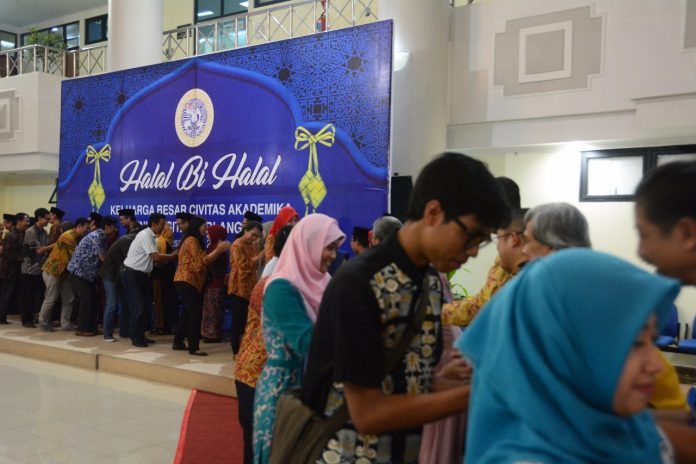UNAIR NEWS – The annual tradition carried out regularly by Muslims during Eid-ul-Fitr is gathering with extended families, groups or office mates. This gathering is commonly known as halalbihalal in the archipelago.
Halalbihalal can be understood as an activity carried out after the fasting month. It is a mean of forgiving fellow Muslims.
It is a moment where people are equal with no social commodity or ridicule that will break the intimacy. The halalbihalal tradition is a tradition initiated by KH Wahab Hasbullah, one of NU’s influential scholars who advised President Soekarno in Ramadan 1948.
According to a cultural expert at Universitas Airlangga (UNAIR) Dr. Listiyono Santoso, SS, M.Hum, halalbihalal is a tradition that is only carried out in Indonesia. The tradition is deeply rooted in the cultural conditions of Indonesian people who have the custom to forgive each other. As a tradition for mutual forgiveness, halalbihalal has a positive meaning that must be maintained and preserved.
“Through halalbihalal carried out truly from the heart with sincerity, it is an important moment to mend the nation polarized by political conflicts or other conflicts. Halalbihalal will be mean to rebuild unity that may have started to break because of political interests, “he concluded.
Dr. Listiyono also said that the halalbihalal carried out after the Eid-ul-Fitr by Javanese tradition is also called Lebaran, “Lebar + an” means the end or after. The term actually refers to the four terms of laku papat (four acts) in Javanese tradition, lebaran, luberan, leburan, and laburan.
Lebaran means the end or after which signifies the end of Ramadan fasting time and is ready to welcome the day of Eid (blessings). Luberan means overflowing like water spilling from a tub of water.
The moral message to be conveyed from luberan is the custom of sharing and donating some of fortunes (overflowing) to the poor. It brings joy to the poor and hopefully reducing the poverty rates in our country.
Leburan means to eradicate. It is the moment to forget each other’s sins by forgiving each other, in other words. The last is Laburan, which comes from the word labur, which means to whiten.
After Eid, a Muslim’s heart must return clear and white like chalk because it is a symbol of clarity and purity of the pure heart. “It seems that it a good moment for halalbihalal, as a mean to achieve national unity so the citizens of the nation will reunite after polarization due to the previous presidential election,” he added. (*)
Author: Muhammad Wildan Suyuti
Editor : Khefti Al Mawalia





